The IUGG Electronic Journal Volume 16 No. 4 (1 April 2016)
INTERNATIONAL UNION OF GEODESY AND GEOPHYSICS
UNION GEODESIQUE ET GEOPHYSIQUE INTERNATIONALE
The IUGG Electronic Journal
Volume 16 No. 4 (1 April 2016)
This informal newsletter is intended to keep IUGG Member National Committees informed about the activities of the IUGG Associations, and actions of the IUGG Secretariat. Past issues are posted on the IUGG website (http://www.iugg.org/publications/ejournals/). Please forward this message to those who will benefit from the information. Your comments are welcome.
Contents
1. International unions and professional societies should respond on harassment
2. Geoscience education: Contribution of IUGG to capacity building
3. UNISDR Science and Technology Conference
4. Fourth Session of the GFCS Partner Advisory Committee
5. News from the International Council for Science (ICSU)
6. Announcement on the15th SEDI Symposium
7. Meeting calendar
1. International unions and professional societies should respond on harassment
International scientific unions and professional societies organize/sponsor general and scientific assemblies, symposia, workshops, and conferences around the world placing scientists in close proximity for many hours/days in unfamiliar settings. Because of the wide international nature of the unions and many professional societies, behavior and language acceptable in one particular cultural environment may be unwelcome or even offensive in another environment. Consequently, individuals must use discretion to ensure that their words and actions communicate respect for others. “Scientific societies need to widely disseminate policies that declare their intolerance for harassment of any sort. These must describe how violations of such policies can be reported, and to whom, and the process for investigating those violations”, said Marcia McNutt, Chief Editor of Science magazine and the President-elect of the U.S. National Academy of Sciences. McNutt added: “Scientific societies are governed by scientists for scientists. Therefore, it is the responsibility of the officers, board, and council members of scientific societies to make sure that policies and procedures are in place to combat harassment in all forms during all society-sponsored events.” On 1 March 2016, following the International Astronomical Union, the IUGG Bureau, with the endorsement of the Executive Committee, approved “Anti Harassment Guidelines” regulating the actions in cases of harassment or discrimination to ensure an inclusive atmosphere that encourages the free expression and exchange of scientific ideas and results. The full text of the guidelines is available at: http://www.iugg.org/meetings/Anti_harassment_guidelines.pdf.
2. Geoscience education: Contribution of IUGG to capacity building
IUGG and the Abdus Salam International Centre for Theoretical Physics (ICTP) continue cooperation in geosciences education. In 2015, IUGG co-sponsored seven workshops and schools organized by ICTP and held in Iran, Italy, and Turkey.
2.1. Workshop on Ionospheric Effects on SBAS and GBAS Applications at Low Latitudes
The workshop was held from 2 to 13 March 2015 in Trieste (ICTP), Italy. 70 scientists attended the activity: 22 Lecturers and instructors from 8 countries and 50 participants from 18 countries. Participants were exposed to both theoretical lectures and hands-on work about a series of themes regarding Global Navigation Satellite Systems (GNSS) operations in general, the particular systems that use augmentation techniques, such as satellite-based augmentation system (SBAS) and groundbased augmentation system (GBAS), and the ionospheric effects that influence their operations. The theoretical topics included the fundamentals of GNSS, basics of aviation systems using GNSS, the ionosphere and ionospheric measurements using GNSS, SBAS and GBAS technologies, and some complementary topics including measurements techniques. An important aspect of the activity was the laboratory hands-on work carried out by the workshop’s participants; the hands-on work included GNSS receiver demonstration laboratory, GNSS total electron content calibration, and exercises with a SBAS simulation platform. The participants divided in working groups were requested to solve problems related to SBAS and GBAS operations, particularly in low latitude regions where ionospheric effects are stronger. The working groups reported their results at the end of the workshop. In the opinion of lecturers and participants, the aim of the workshop of contributing to the promotion of ionospheric research in low latitude countries to support the needs of navigation satellite augmentation systems, has been fulfilled. More information:http://indico.ictp.it/event/a14232/
2.2. Third Workshop on Water Resources in Developing Countries
The workshop was held from 27 April to 8 May 2015 in Trieste (ICTP), Italy. The workshop addressed the major challenges facing the water resources planning community: assessment of the impact of climate change and variability on the different component of the water cycle. The most influential component of the water cycle for resource management is precipitation, especially its extremes causing floods and droughts. The reliability of projection of precipitation (average, distribution, frequency, intensity) is still less than adequate and limits its usefulness to decision management of the water systems. Aside from the issue of reliability of precipitation projections, which are usually obtained from global or regional climate models (GCM/RCM), there is also the need for estimates at resolutions sufficiently fine for simulating the water cycle at watershed and useful hydrological scales. Therefore, there continues to be a need to bridge the resolution gap between the global or regional and the river basin scale. Moreover, the hydrological model outputs are very sensitive to the GCM/RCM biases therefore often bias correction techniques have to be applied before the GCM/RCM output can be used to input the hydrological models. The workshop was composed of one week of lectures and laboratory training followed by a second week of laboratory sessions. More information: http://indico.ictp.it/event/a14265
2.3. International Conference and School on Structure, Tectonics and Earthquakes in the
Alborz-Zagros-Makran Region
The International Conference and School were held from 22 to 31 May 2015 in Tehran, Iran. The purpose of the 3-day conference and the following 6-day school was to present the latest developments in the field of earthquake hazards and to motivate and train participants with particular attention to the following topics: (i) continental tectonics: kinematics (fault patterns) and dynamics (driving forces) of continental deformation, and their relation to understanding earthquake-related hazards; (ii) monitoring and observational foundations of earthquake hazards: the essential modern toolkit, including earthquake seismology, satellite-based radar interferometry (InSAR), GPS, field- and space-based geomorphology and Quaternary geology, paleo-seismology;(iii) associated earthquake hazards: understanding tsunamis and landslides; and (iv) modelling continental deformation and the earthquake cycle: using models to link geophysical, geological and geomorphological data to hazard evaluation. The program was specifically designed to benefit scientists in countries that are vulnerable to earthquake hazards, but who currently lack the local infrastructure, expertise, national capability or critical mass of researchers to be effective. More than 20 experts from France, Germany, India, Iran, Italy, Switzerland, and the UK, who have done extensive work in the region, were invited to deliver lectures at the Conference and to contribute to the School. The Conference had more than 120 registered participants from India, Iran, Kazakhstan, Pakistan, Syria, and the UK. However, the conference was open to unregistered experts as well. The 6-day School was a mixture of theoretical and practical courses and thus limited to registered participants only (see photos taken during the school below). About 45 scientist and students from Iran and other countries participated in the School. Many students presented their research at poster sessions of the conference and school. More information: http://indico.ictp.it/event/a14263.
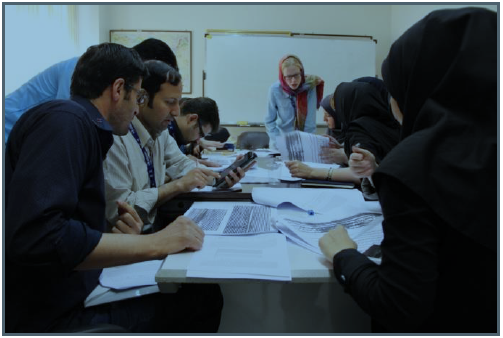
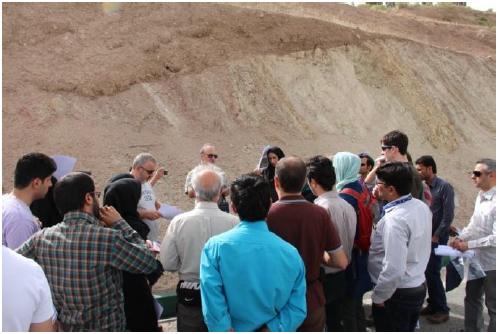
2.4. Workshop on Modelling of Wildfires and their Environmental Impacts
The workshop was held from 22 to 26 June 2015 in Trieste (ICTP), Italy. 16 lecturers from 6 countries, workshop organizers, and 41 students from 25 different countries took part in the workshop. The workshop was very well balanced, both from a scientific and geographical perspective, and the expertise of theorganizers and faculty were all elements that made it very successful. The first part of the week was mainly dedicated to presentations about the physics ofwildfires and high resolution studies, while the second part was principally devoted to impacts. This allowed the participants to get a very synthetic overview of the different implications of wild fire activity including ecosystem dynamics, civil security, climate and air pollution. The afternoons were dedicated to hands-on computer sessions using state of the art wild fire models. The practical sessions were perhaps the greatest success of the workshop, with a lot of interactions between participants and instructors sometime running until late evening. The participants were very motivated and managed to get the know-how and data necessary to run a model and to pursue research on wildfires modeling back at their home institutions. More information:http://indico.ictp.it/event/a14267/.
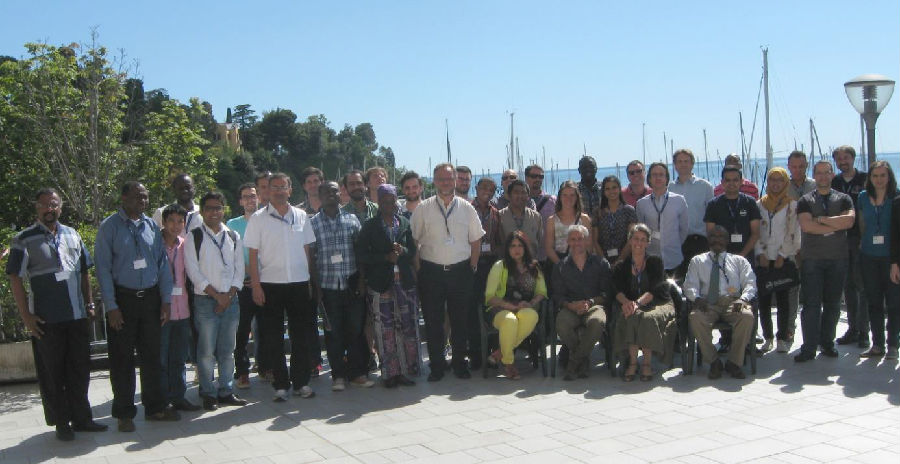
2.5. Workshop on Uncertainty Quantification in Climate Modeling and Projection
The workshop was held in Trieste (ICTP), Italy from 13 to 17 July 2015. The prediction of future climate change is one of the most complex problems undertaken by the scientific community. Although scientists have been striving to better understand the physical basis of the climate system behavior and to improve climate models, the overall uncertainty in projecting future climate has not been reduced (e.g., from the IPCC 2007 to 2013). With the rapid increase of complexity in Earth system models, reducing uncertainties and increasing reliability of climate projections becomes an extremely challenging task. Since uncertainties always exist in climate models, interpreting model simulations and quantifying uncertainty is a key to understanding and modeling atmospheric, land, ocean, and socio-economic phenomena and processes. Meanwhile, climate change adaption and impact on communities rely on climate models to provide climate change information. Such information, if not accurate, should be provided with well-quantified uncertainty. Uncertainty Quantification (UQ) is a fundamental challenge in numerical simulations of Earth’s weather and climate. It entails much more than attaching defensible error bars to predictions. In recent years, formal methods of verification, validation, and UQ employed in other simulation problems have been applied to climate simulations. The topics discussed in this workshop included many aspects of UQ in climate modeling, such as identifying sources of uncertainty, describing uncertainty associated with input parameters, evaluating model uncertainty through validation against observations, model comparison between numerical and/or analytical solutions, and upscaling/downscaling, as well as quantifying uncertainty through both forward modeling (sensitivity analyses) and inverse modeling (optimization/calibration) in all components of climate and integrated Earth system models at various spatial and temporal scales. The workshop aimed at providing both theoretical lectures and hands-on sessions on the theory and application of the various UQ methods and approaches, such as sensitivity analysis, construction of surrogate models and response surfaces, input parameter calibration studies, forward propagation of uncertainties, and assessment of model discrepancies and structural uncertainties. Supervised by the directors and lecturers, participants were encouraged to design, complete and report on short research projects during the event. More information: http://indico.ictp.it/event/a14268/
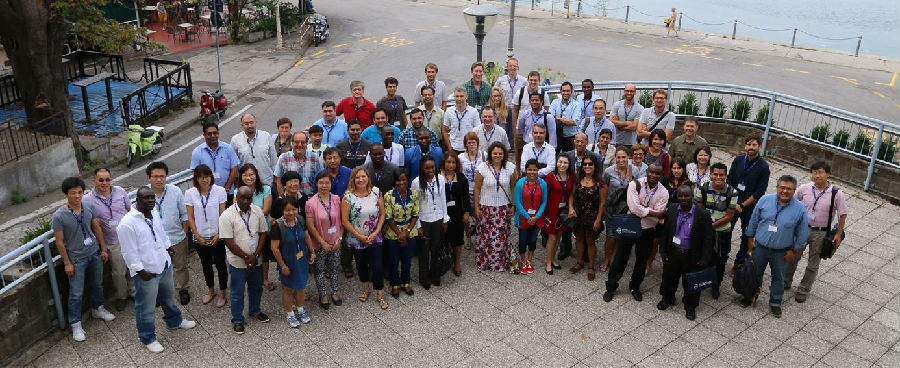
2.6. Summer School on Ocean Climate Modelling: Physical and biogeochemical dynamics of
semi-enclosed seas
The Summer School took place from 28 September to 1 October 2015 in Ankara, Turkey. The School attracted some of the best ocean modelers from Germany, Italy, Turkey, and the USA, and 27 selected students and early career scientists. Attendants came from Croatia, Greece, Iran, the Netherlands, Russia, Turkey, and Ukraine. The school focused on the dynamics of coastal and semienclosed seas and its relevance to global scale circulation. Given that a large fraction of the students were from the Turkish community and neighboring countries, the school emphasized topics that are relevant for the Mediterranean, Black, and Caspian Seas. Lectures introduced students to regional and coastal modeling with emphasis on upwelling, nesting capabilities, adaptive grid solutions and applications to biogeochemical dynamics and their representation in physical models. Particularattention was given to physical-biogeochemical interactions in upwelling regions. Dynamics of straits and overflows were also treated in terms of their local effects and numerical representation, as well as their global impact in terms of circulation variability and stability. The themes of the activity covered (i) process understanding (dynamics of straits, overflows, mixing and upwelling) and (ii) modeling solutions (fine-resolution, nested, and adaptive grids). Modeling semi-enclosed seas and coastal regions implies impacts on biogeochemistry, fisheries, ocean forecasting and relevance to general circulation models. The last part of the school thus covered the main aspects of coastal forecasting and operational oceanography. The summer school was followed by a mini workshoplargely devoted to the CLIVAR (Climate and Ocean – Variability, Predictability and Change) Research Focus on upwelling. The goal was to expand a couple of the foci of the summer school, namely upwelling and biogeochemisty, from a regional context to a broader, but still limited context, i.e., focusing on eastern boundary upwelling regions, including biogeochemistry. The Mediterranean, Black and Caspian Seas, in the middle of three large continents of contrasting climates, regulated with vital multi-scale interactions by complex topographies and interconnecting straits, exemplify all the complexity and climatic controls relevant for the world ocean. Some of the processes of common interest for semi-enclosed basins as well as the world ocean are persistent upwelling, coherent structures, coastal and mid-sea jets and currents, shelf and open sea convection, thermohaline circulation cells, inter-basin exchange flows and hydraulic controls. More
information: http://indico.ictp.it/event/a14262/
2.7. International School on Geothermal Development
The International School was held in Trieste (ICTP), Italy from 7 to 12 December 2015. Geothermal energy offers unique possibilities to support the sustainable progress of the economy of developing and least developed countries through the extensive utilization of a renewable energy source. Its peculiar characteristics make it particularly appealing as a renewable, stable, reliable, cost-effective and environmentally benign solution for the energy challenge of the third millennium. Exploration focuses on the initial phase of any geothermal project, namely the identification and assessment of resources by means of integrated geological, remote sensing, geochemical and geophysical methods. The School provided advanced knowledge of geothermal exploration methods with specific reference to the following topics: (i) geothermal energy resourcesdistribution with specific reference to geologic and tectonic framework; (ii) geological surveying methods through lectures, tutorials and case studies/histories; (iii) remote sensing, (iv) geochemical and (v) geophysical methods in geothermal exploration through lectures, case studies and laboratory sessions; and(vi) reservoir engineering and numerical modeling with laboratory sessions on geothermal power plants. More information: http://indico.ictp.it/event/a14273/.
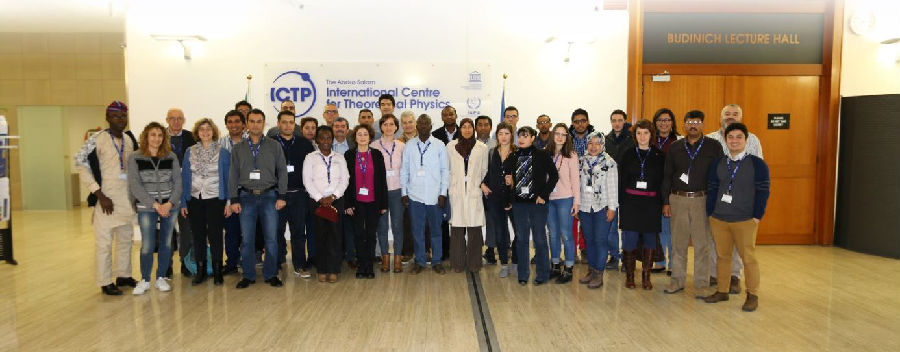
(Photos: ICTP)
3. UNISDR Science and Technology Conference
The United Nations Office for Disaster Risk Reduction (UNISDR) organized the Science & Technology (S&T) Conference in Geneva, Switzerland, on 27-29 January 2016, which was attended by some 750 delegates. The Sendai Framework (SF) for Disaster Risk Reduction (DRR) 2015-2030 was adopted by its Member States on 18 March 2015 at the World Conference on DRR held in Japan, and endorsed by the UN General Assembly in June 2015. The SF promotes shifting the focus from managing disasters to managing risks. This requires a better understanding of risk in all its dimensions of vulnerability, exposure and hazards. It aims to ensure that the multi-hazard management of disaster risk is factored into the development at all levels as well as within and across all sectors. The SF recognizes the importanceof science and technology for disaster risk reduction. The goal of the SF is to prevent new and reduce existing disaster risk through the implementation of integrated and inclusive economic, structural, legal, social, health, cultural, educational, environmental, technological, political and institutional measures that prevent and reduce hazard exposure and vulnerability to disaster, increase preparedness for response and recovery, and thus strengthen resilience.The aim of the Conference was to develop a S&T Roadmap of the SF implementation. This Roadmap presents the expected outcomes under each of the four priorities of actions outlined in the SF, and proposes key actions that the UNISDR S&T Partnership will undertake to fulfill the expected outcomes and to achieve the SF goal. It also highlights the ways for monitoring progress and reviewing needs. At the conference, many scientists and policymakers pledged to step up action on the SF.
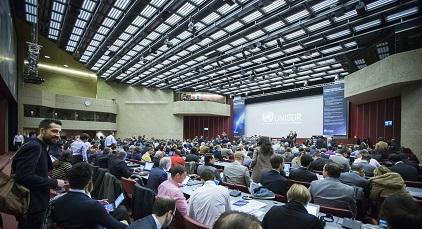
(Source: http://www.unisdr.org/archive/47590)
The Conference included four Work Streams: (1) The S&T Partnership for the implementation of the SF; (2) Understanding disaster risk, risk assessment, and early warning; (3) Use of science, technology and innovation tools, methods and standards; and (4) Leveraging science through capacity development and research. Each Work Stream included a Plenary, followed by poster presentations, three parallel panel discussions and a wrap-up session. IUGG Secretary General Alik Ismail-Zadeh participated in the Conference and took part in three panel discussions: (i) Global science and technology networks and platforms; (ii) Multi-hazard risk assessment and management; and (iii) Leveraging science.
4. Report on the Fourth Session of the GFCS Partner Advisory Committee
The Fourth Session of the Partner Advisory Committee of the Global Framework for Climate Services (GFCS) was held on 11 and 12 February 2016 in the offices of the United Nations Development Programme in Geneva. It was attended by some 26 individuals representing 13 Members of the Committee and three Observers. As with the Third Session, the two days passed in very amicable and constructive discussion with all present recognizing the importance ofworking together to achieve the aims of the GFCS, not so much on paper but out in the field. Some of the Members, such as the World Bank, are spending billions of US$ on GFCS-related projects in developing countries while others, such as IUGG, have no budgets for such work but are still made welcome. The World Meteorological Organization (WMO) has clearly done an excellent job in promoting the concept of climate services and the need for such services is now widely recognized. As a consequence, well-funded projects are being implemented in many countries, but they all-too-often lack co-ordination. A key purpose of the PAC is to help resolve this problem. A number of GFCS Partners were actively involved in COP21 in Paris, France, in December 2015, and it was pleasing to see a reference to science for climate services being mentioned in paragraph 7, section 7c of the Paris Agreement as “strengthening scientific knowledge on climate, including research, systematic observation of the climate system and early warning systems, in a manner that informs climate services and supports decision- making”. The current El Niño is also helping to focus attention at national and international level on the need for climate services and many of the Partners are involved in actions to respond to the situation.
Arthur Askew, IUGG Principal Liaison to WMO and GFCS
5. News from the International Council for Science (ICSU)
IPBES publishes its first assessment on pollinators & food production The Intergovernmental Science-Policy Platform on Biodiversity and Ecosystem Services (IPBES) is the intergovernmental body assessing the state of biodiversity and of the ecosystem services it provides to society, in response to requests from decision makers. IPBES is placed under the auspices of four United Nations (UN) entities: UN Environmental Programme (UNEP), UNESCO, Food and Agriculture Organization, and UN Development Programme and administered by UNEP. Its secretariat is hosted by the German government and located on the UN campus, in Bonn, Germany. One thousand scientists from all over the world currently contribute to the work of IPBES on a voluntary basis. They are nominated by their government or an organization, and selected by the Multidisciplinary Expert Panel. Peer review forms a key component of the work of IPBES to ensure that a range of views is reflected in its work, and that the work is complete to the highest scientific standards. On 26 February 2016, IPBES approved its first-ever assessment on pollinators, pollination and food production (http://www.ipbes.net/article/press-release-pollinators-vitalour-food-supply-under-threat). The assessment involved over seventy authors and was a result of a two-year study. The assessment’s summary for policymakers highlights that animal pollination plays a vital role for ecosystems and people, and the central role of a large variety of pollinators including bees, moths, butterflies, bats, and many other species.
Global Climate Observation conference held in Amsterdam
The Global Climate Observing System (GCOS) scientific conference was held in Amsterdam from 2 to 4 March 2016. This first dedicated scientific conference organized by GCOS on the topic of climate observations gathered more than 150 participants from different disciplines and research groups (e.g. land, ocean and atmosphere). GCOS is an interdisciplinary body of ICSU, cosponsored with the World Meteorological Organization, the Intergovernmental Oceanographic Commission of UNESCO and UNEP. The conference made the case that making progress towards a fully implemented, sustainable, global observing system for climate is crucial for improving understanding of the workings of the climate system and assessing its impacts. It provided a forum for a community assessment of the quality of the current observing system.
Source: ICSU website
6. Announcement of the 15th SEDI Symposium
The IUGG Union Commission “Study of the Earth's Deep Interior” (SEDI) organizes biennial international symposia. The ultimate goal of SEDI is an enhanced understanding of the past evolution and current thermal, dynamical and chemical state of the Earth's deep interior and of the effect that the interior has on the structures and processes observed at the surface of the Earth. The 'deep interior' is generally considered to be the core and lower mantle, but interest may extend to the surface, for example, in the study of mantle plumes or dynamics of descending lithospheric slabs.
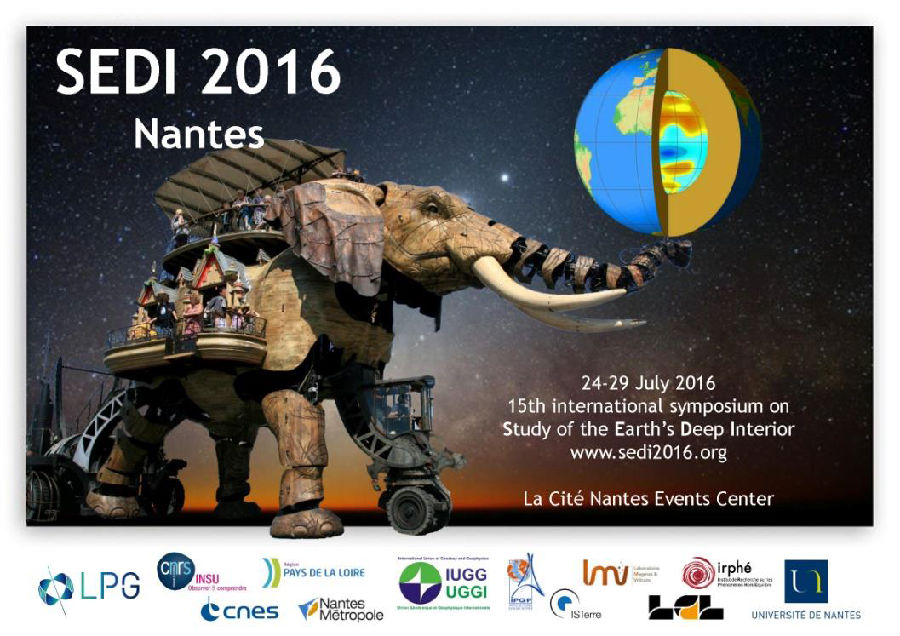
The 15th SEDI Symposium will be held in Nantes, France, from 24 to 29 July 2016. The meeting will take place at La Cité Nantes Events Centre (in the downtown) near the Loire River. The Laboratoire de Planétologie et Géodynamique de Nantes is in charge of the local organization.
Important deadlines:
- Support application: 20 April 2016
- Early bird registration: 15 May 2016
- Regular registration: 1 July 2016
- Abstract submission deadline: 1 July 2016
7. Meeting calendar
A calendar of meetings of interest to IUGG disciplines (especially those organized by IUGG Associations) is posted on the IUGG website (http://www.iugg.org/calendar.php). Individual Associations also list more meetings on their websites according to their disciplines.
April
- 2-5, IASPEI, IUGG, Luxor-Aswan, Egypt, First General Assembly of the African
Seismological Commission (AfSC 2016). Web: http://afsc2016.org
- 5-7, DLR, UNOOSA, Cologne, Germany, DLR Conference on Climate Change – Challenges
for Atmospheric Research. Web: http://www.ccc2016.net/home
- 6-8, WCRP, WWRP, IAMAS/ICDM, Reading, UK, Workshop on Atmospheric Blocking.
Web: http://www.sparcclimate.
org/meetings/Workshop_on_Atmospheric_Blocking_Reading_April2016
- 12-13, ICSU, Paris, France, Scientific Unions Meeting.
- 12-14, IAMAS, SCOSTEP, SCAR, Cambridge, UK, 3rd International ANtarctic Gravity
Wave Instrument Network (ANGWIN) science workshop (VARSITI-SCOCTEP/SCAR).
Web: https://www.eventbrite.co.uk/e/3rd-international-antarctic-gravity-wave-...
angwin-science-workshop-registration-20754077003
- 12-15, IAG, St. Petersburg, Russia, IAG Symposium on Terrestrial Gravimetry: Static and
Mobile Measurements. Web: http://www.elektropribor.spb.ru/tgsmm2016/eindex.ru
- 17-22, EGU, Vienna, Austria, European Geosciences Union General Assembly 2016. Web:
- 16-22, IAMAS, IUGG, Auckland, New Zealand, International Radiation Symposium 2016.
Web: http://irs2016.org
May
- 17-20, WCRP, Stockholm, Sweden, International Conference on Regional Climate-
CORDEX 2016 (ICRC-CORDEX 2016). Web: http://www.icrc-cordex2016.org
- 18-20, IAHS, IUGG, Bochum, Germany, 7th International Water Resources Management
Conference of ICWRS. Web: http://iahs-rub.hydrology.ruhr-uni-bochum.de
- 22-27, AGU, Dubrovnik, Croatia, Chapman Conference on Currents in Geospace and
Beyond. Web: http://chapman.agu.org/spacecurrents
- 23-27, IAPSO, IUGG, SCOR, Liège, Belgium, 48th International Liège Colloquium on
Ocean Dynamics: “Submesoscale Processes: Mechanisms, Implications and new Frontiers”.
Web: http://modb.oce.ulg.ac.be/colloquium
- May 23-June 3, ICTP, IUGG, Trieste, Italy, Eighth ICTP Workshop on the Theory and Use
of Regional Climate Models. Web: http://indico.ictp.it/event/7613
June
- 5-9, IAG, Trieste, Italy, 18th International Symposium on Geodynamics and Earth Tides (GET
2016). Web: http://g-et2016.units.it
- 6-10, CMG, IUGG, Paris, France, 31st IUGG Conference on Mathematical Geophysics:
From Mathematics to Experiments (CMG2016). Web: http://cmg2016.sciencesconf.org/
- 6-10, IAG, Ulaanbaatar, Mongolia, International Service for the Geoid (ISG) Geoid School.
Web: http://www.isgeoid.polimi.it/
- 7-17, IACS, IUGG, McCarthy, AK, USA, International Summer School in Glaciology.
Web: http://glaciers.gi.alaska.edu/courses/summerschool
- 13-17, IAMAS, Helsinki, Finland, 6th International HEPPA-SOLARIS Workshop. Web:
http://heppa-solaris-2016.fmi.fi/
- 13-17, IASPEI, IUGG, Apatity, Kola Peninsula, Russia, X International Workshop “Physics
and Forecasting of Rock Destruction” and VI Russian-China Scientific Forum “Challenges
of non-linear geomechanics at large depths”. Web: http://www.xmsc.ru/#!homegeneral/
zvq2f
- 15-17, IAHS, Paris, France, 12th Kovacs Colloquium “Water-related SDGs implementation:
Knowledge, data, indicators, tools & innovations”.
- 20-22, IASPEI, IUGG, San Jose, Costa Rica, Regional Assembly Latin American and
Caribbean Seismological Commission (LACSC-2016). Web:
http://www.iaspei.org/news_items/LACSC.php
- June 27 - July 7, ICTP, IUGG, Trieste, Italy, Summer School on Aerosol-Cloud Interactions
and International CFMIP Conference on Clouds, Circulation and Climate Sensitivity. Web:
http://indico.ictp.it/event/7614/
End of IUGG Electronic Journal Volume 16 Number 4 (1 April 2016)
Editors: Tom Beer, Alik Ismail-Zadeh (Editor-in-Chief), Franz Kuglitsch (Associate Editor), and
Kathryn Whaler.


